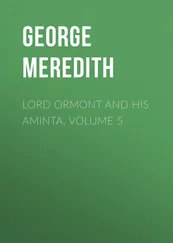George Meredith - Lord Ormont and His Aminta. Complete
Здесь есть возможность читать онлайн «George Meredith - Lord Ormont and His Aminta. Complete» — ознакомительный отрывок электронной книги совершенно бесплатно, а после прочтения отрывка купить полную версию. В некоторых случаях можно слушать аудио, скачать через торрент в формате fb2 и присутствует краткое содержание. Жанр: foreign_prose, literature_19, foreign_antique, на английском языке. Описание произведения, (предисловие) а так же отзывы посетителей доступны на портале библиотеки ЛибКат.
- Название:Lord Ormont and His Aminta. Complete
- Автор:
- Жанр:
- Год:неизвестен
- ISBN:нет данных
- Рейтинг книги:4 / 5. Голосов: 1
-
Избранное:Добавить в избранное
- Отзывы:
-
Ваша оценка:
- 80
- 1
- 2
- 3
- 4
- 5
Lord Ormont and His Aminta. Complete: краткое содержание, описание и аннотация
Предлагаем к чтению аннотацию, описание, краткое содержание или предисловие (зависит от того, что написал сам автор книги «Lord Ormont and His Aminta. Complete»). Если вы не нашли необходимую информацию о книге — напишите в комментариях, мы постараемся отыскать её.
Lord Ormont and His Aminta. Complete — читать онлайн ознакомительный отрывок
Ниже представлен текст книги, разбитый по страницам. Система сохранения места последней прочитанной страницы, позволяет с удобством читать онлайн бесплатно книгу «Lord Ormont and His Aminta. Complete», без необходимости каждый раз заново искать на чём Вы остановились. Поставьте закладку, и сможете в любой момент перейти на страницу, на которой закончили чтение.
Интервал:
Закладка:
George Meredith
Lord Ormont and His Aminta – Complete
CHAPTER I. LOVE AT A SCHOOL
A procession of schoolboys having to meet a procession of schoolgirls on the Sunday’s dead march, called a walk, round the park, could hardly go by without dropping to a hum in its chatter, and the shot of incurious half-eyes the petticoated creatures—all so much of a swarm unless you stare at them like lanterns. The boys cast glance because it relieved their heaviness; things were lumpish and gloomy that day of the week. The girls, who sped their peep of inquisition before the moment of transit, let it be seen that they had minds occupied with thoughts of their own.
Our gallant fellows forgot the intrusion of the foreign as soon as it had passed. A sarcastic discharge was jerked by chance at the usher and the governess—at the old game, it seemed; or why did they keep steering columns to meet? There was no fun in meeting; it would never be happening every other Sunday, and oftener, by sheer toss-penny accident. They were moved like pieces for the pleasure of these two.
Sometimes the meeting occurred twice during the stupid march-out, when it became so nearly vexatious to boys almost biliously oppressed by the tedium of a day merely allowing them to shove the legs along, ironically naming it animal excise, that some among them pronounced the sham variation of monotony to be a bothering nuisance if it was going to happen every Sunday, though Sunday required diversions. They hated the absurdity in this meeting and meeting; for they were obliged to anticipate it, as a part of their ignominious weekly performance; and they could not avoid reflecting on it, as a thing done over again: it had them in front and in rear; and it was a kind of broadside mirror, flashing at them the exact opposite of themselves in an identically similar situation, that forced a resemblance.
Touching the old game, Cuper’s fold was a healthy school, owing to the good lead of the head boy, Matey Weyburn, a lad with a heart for games to bring renown, and no thought about girls. His emulation, the fellows fancied, was for getting the school into a journal of the Sports. He used to read one sent him by a sporting officer of his name, and talk enviously of public schools, printed whatever they did—a privilege and dignity of which, they had unrivalled enjoyment in the past, days, when wealth was more jealously exclusive; and he was always prompting for challenges and saving up to pay expenses; and the fellows were to laugh at kicks and learn the art of self-defence—train to rejoice in whipcord muscles. The son of a tradesman, if a boy fell under the imputation, was worthy of honour with him, let the fellow but show grip and toughness. He loathed a skulker, and his face was known for any boy who would own to fatigue or confess himself beaten. “Go to bed,” was one of his terrible stings. Matey was good at lessons, too—liked them; liked Latin and Greek; would help a poor stumbler.
Where he did such good work was in sharpening the fellows to excel. He kept them to the grindstone, so that they had no time for rusty brooding; and it was fit done by exhortations off a pedestal, like St. Paul at the Athenians, it breathed out of him every day of the week. He carried a light for followers. Whatever he demanded of them, he himself did it easily. He would say to boys, “You’re going to be men,” meaning something better than women. There was a notion that Matey despised girls. Consequently, never much esteemed, they were in disfavour. The old game was mentioned only because of a tradition of an usher and governess leering sick eyes until they slunk away round a corner and married, and set up a school for themselves—an emasculate ending. Comment on it came of a design to show that the whole game had been examined dismissed as uninteresting and profitless.
One of the boys alluded in Matey’s presence to their general view upon the part played by womankind on the stage, confident of a backing; and he had it, in a way: their noble chief whisked the subject, as not worth a discussion; but he turned to a younger chap, who said he detested girls, and asked him how about a sister at home; and the youngster coloured, and Matey took him and spun him round, with a friendly tap on the shoulder.
Odd remarks at intervals caused it to be suspected that he had ideas concerning girls. They were high as his head above the school; and there they were left, with Algebra and Homer, for they were not of a sort to inflame; until the boys noticed how he gave up speaking, and fell to hard looking, though she was dark enough to get herself named Browny. In the absence of a fair girl of equal height to set beside her, Browny shone.
She had a nice mouth, ready for a smile at the corners, or so it was before Matey let her see that she was his mark. Now she kept her mouth asleep and her eyes half down, up to the moment of her nearing to pass, when the girl opened on him, as if lifting her eyelids from sleep to the window, a full side—look, like a throb, and no disguise—no slyness or boldness either, not a bit of languishing. You might think her heart came quietly out.
The look was like the fall of light on the hills from the first of morning. It lasted half a minute, and left a ruffle for a good half-hour. Even the younger fellows, without knowing what affected them, were moved by the new picture of a girl, as if it had been a frontispiece of a romantic story some day to be read. She looked compelled to look, but consenting and unashamed; at home in submission; just the look that wins observant boys, shrewd as dogs to read by signs, if they are interested in the persons. They read Browny’s meaning: that Matey had only to come and snatch her; he was her master, and she was a brave girl, ready to go all over the world with him; had taken to him as he to her, shot for shot. Her taking to the pick of the school was a capital proof that she was of the right sort. To be sure, she could not much help herself.
Some of the boys regretted her not being fair. But, as they felt, and sought to explain, in the manner of the wag of a tail, with elbows and eyebrows to one another’s understanding, fair girls could never have let fly such look; fair girls are softer, woollier, and when they mean to look serious, overdo it by craping solemn; or they pinafore a jigging eagerness, or hoist propriety on a chubby flaxen grin; or else they dart an eye, or they mince and prim and pout, and are sigh-away and dying-ducky, given to girls’ tricks. Browny, after all, was the girl for Matey.
She won a victory right away and out of hand, on behalf of her cloud-and-moon sisters, as against the sunny-meadowy; for slanting intermediates are not espied of boys in anything: conquered by Browny; they went over to her colour, equal to arguing, that Venus at her mightiest must have been dark, or she would not have stood a comparison with the forest Goddess of the Crescent, swanning it through a lake—on the leap for run of the chase—watching the dart, with her humming bow at breast. The fair are simple sugary thing’s, prone to fat, like broad-sops in milk; but the others are milky nuts, good to bite, Lacedaemonian virgins, hard to beat, putting us on our mettle; and they are for heroes, and they can be brave. So these boys felt, conquered by Browny. A sneaking native taste for the forsaken side, known to renegades, hauled at them if her image waned during the week; and it waned a little, but Sunday restored and stamped it.
By a sudden turn the whole upper-school had fallen to thinking of girls, and the meeting on the Sunday was a prospect. One of the day-boarders had a sister in the seminary of Miss Vincent. He was plied to obtain information concerning Browny’s name and her parents. He had it pat to hand in answer. No parents came to see her; an aunt came now and then. Her aunt’s name was not wanted. Browny’s name was Aminta Farrell.
Читать дальшеИнтервал:
Закладка:
Похожие книги на «Lord Ormont and His Aminta. Complete»
Представляем Вашему вниманию похожие книги на «Lord Ormont and His Aminta. Complete» списком для выбора. Мы отобрали схожую по названию и смыслу литературу в надежде предоставить читателям больше вариантов отыскать новые, интересные, ещё непрочитанные произведения.
Обсуждение, отзывы о книге «Lord Ormont and His Aminta. Complete» и просто собственные мнения читателей. Оставьте ваши комментарии, напишите, что Вы думаете о произведении, его смысле или главных героях. Укажите что конкретно понравилось, а что нет, и почему Вы так считаете.












